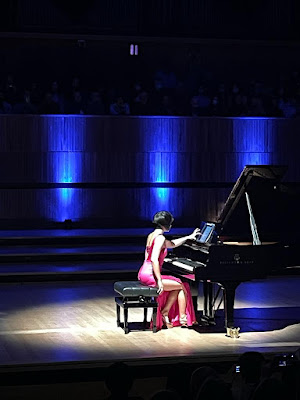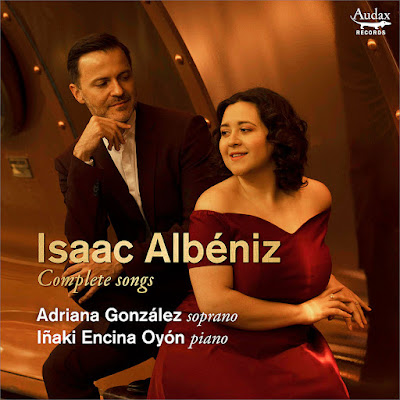There have been a crop of recordings coming out of musicians’ exploits during lockdown, and violinist Sara Trickey is a strong addition to the field (released 21 October). Trickey posted weekly videos of solo violin music via YouTube, and as well as bringing her performances to new audiences, she enjoyed the communication from listeners too. As the world returns to some sort of normality of performance, that intimacy of connection is something many performers are now missing. Trickey has recorded a range of repertoire here from those weekly videos, the majority being contemporary works, with several world première recordings and a number of compositions specifically written for her. She begins however with Albéniz’s (1860-1909) popular Asturias from his Suite Española No. 1, Op. 47, in a strong arrangement by Jane Gillie. Written for piano, but also well known in the guitar version, it works remarkably well on the violin, and the instrument has the additional advantage when it comes to sustaining the melodic lines. Trickey communicates the dramatic rhythmic energy, but also adds this element of sustain to the melodies. Telemann’s (1681-1767) Fantasie No. 1 receives a pleasingly light interpretation, with introspection in the slow sections, and an energetic bounce in the faster movements. Her Prokofiev (1891-1953) Violin Sonata, Op. 115 is full of playfulness, dancing through the outer movements, with a light-footed approach to the variations in the middle movement. Norwegian composer Bjarne Brustad (1895-1978) was new to me, and his wistful Lento from his Fanitulsuite No. 1 is beautifully played here, with an ethereal breathy tone in its repeated patterns, often echoed by glassy harmonics. Sally Beamish’s (b.1956) The Wise Maid is folksy and playful, with a surprise towards the end as the harmonies suddenly shift and slide into its quirky conclusion. James Francis Brown’s (b.1969) Soliloquy, written for Trickey, is evocative and improvisatory, again with that introspective feel that speaks of lockdown and isolation. Errollyn Wallen’s (b.1958) Bertha, for which Trickey is joined by Rosie Bergonzi on the handpan is a curious mix of racing, scratchy energy that almost can’t be contained by the gentle insistence of the handpan, followed by a move into more gently rocking rhythms and a delicate song melody from the violin, before the earlier energy returns. David Matthews’ (b.1943) Prelude no. 12 from his set of 15 was written for Trickey’s birthday, with delicate lyricism and birdlike trilling packed into its brief two minutes. Lyell Creswell (1944-2022) sadly passed away just after the recording of his Lento, written for Trickey back in 1994. It has a moving simplicity, played with touching intimacy, and Trickey also played this at Creswell’s funeral earlier this year. The disc ends with a more flamboyant encore piece from Aleksey Igudesman (b.1973). His Applemania is full of energetic, insistent rhythms, with an infectious build which almost bursts out at its conclusion – a fitting celebration perhaps of an end to lockdown. Overall, this is a fascinating survey of varied solo violin repertoire, and speaks of intense commitment and a desire to communicate, as well as clear virtuosic command from Trickey.
Various. 2022. From an Empty Room. Sara Trickey. Compact Disc. First Hand Records FHR139.
Pianist Louis Lortie has reached Volume 7 of his Chopin survey, and this volume contains a good spread of the Mazurkas, perhaps the quirkiest genre of Chopin’s (1810-1849) output. Lortie immediately sets out his store with a stylish swagger in the first of the Op. 17 set. The second is suitably wistful, and then he manages well the slightly seasick, circling repetitions of the third, giving the sombre fourth a delicate poignancy, with some relief in its gently throbbing central section. The Op. 68 set is a more mixed bag – the first is a little on the weighty side, but the sombre mood of the second has a lightness contrasting with its thrumming central section. The third has an authoritative command, with light echoes. Lortie saves back the fourth, the most wistfully exploratory, to the end of the disc. For the Op. 30 set, we’re back in sombre territory for Nos. 1 and 2, whilst No. 3 has a ballroom swagger, and the fourth pushes chromaticism the furthest. From Op. 63, No. 1 has a gently meandering central section, surrounded by more ballroom swaying. Lortie gives the nostalgic second a gentle sway too, and the third follows in the same vein. He brings a great delicacy of touch to the delightful Rondo à la Mazur, Op. 5, composed by Chopin aged 16, and full of youthful exuberance, but equally poise and control in its lighter sections. The Boléro, Op. 19, after an opening flourish, settles into a gently lilting melody, before the boléro proper arrives, with its polonaise-like, bouncing accompaniment under its infectious melody. The Rondo, Op. 16 has a highly dramatic introduction, and Lortie lets this develop with virtuosic command, before giving the rondo theme a gently playful bounce, enjoying the gradual build in virtuosic display. The Tarantelle, Op. 43 is a swirling whirlwind, given great energy here by Lortie. The ‘Héroïque’ Polonaise, Op. 53 carries suitable weight, but Lortie avoids overegging the pudding, maintaining a sense of dance amidst the heft. Another great volume in this strong survey.
Chopin, F. 2022. Louis Lortie plays Chopin, Vol. 7. Louis Lortie. Compact Disc. Chandos CHAN 20241.






